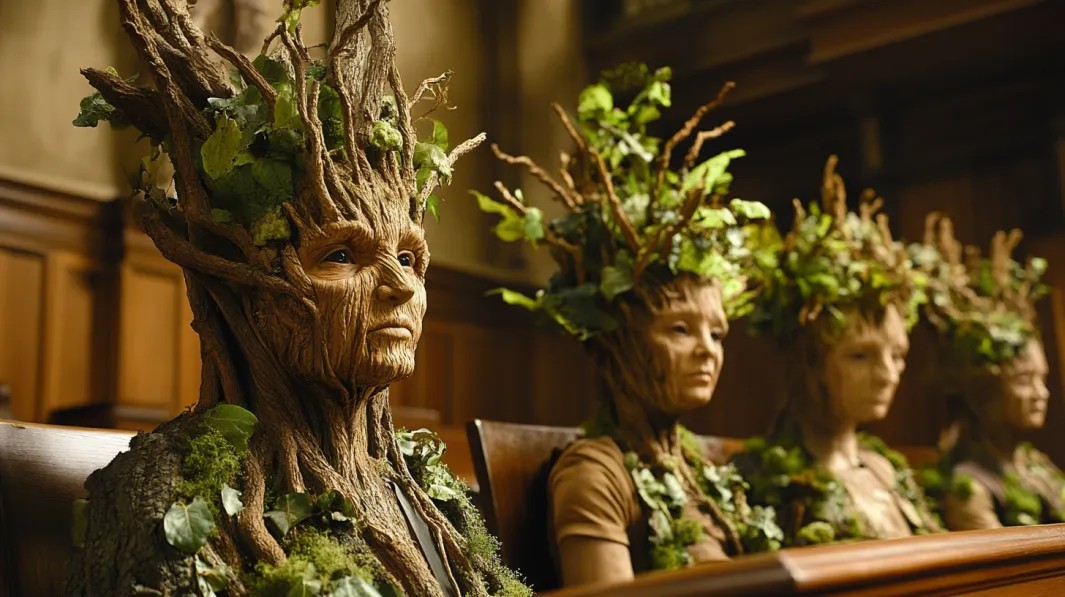Connecticut Enacts Landmark Law Granting Trees the Right to Sue for Deforestation

In an unprecedented move toward environmental conservation, the State of Connecticut has passed the "Flora Rights Act," a groundbreaking law that grants trees and forests the legal standing to sue individuals, corporations, and government entities for damages resulting from deforestation and other ecological harms.
A New Era of Environmental Justice
Governor Eleanor Thompson signed the bill into law yesterday afternoon on the steps of the State Capitol in Hartford, surrounded by environmental activists, legal scholars, and a symbolic assembly of saplings representing the state's diverse tree population.
"Today, we recognize that our forests are not just a resource to be exploited but living entities that deserve protection and a voice in our legal system," Governor Thompson declared. "By granting trees legal rights, we are taking a bold step toward preserving our natural heritage for future generations."
How the Law Works
Under the new legislation, trees and forests within Connecticut are granted "legal personhood," allowing them to be represented in court by appointed guardians—typically environmental organizations or state-appointed advocates. These guardians can file lawsuits on behalf of trees against parties that cause them harm through actions like illegal logging, pollution, or development without proper permits.
The law also establishes the Office of the Tree Advocate (OTA), a new state agency responsible for overseeing the legal representation of trees and ensuring their interests are considered in policy decisions.
Support from Environmental Groups
Environmental organizations have lauded the law as a significant advancement in ecological protection. "This is a monumental day for environmental justice," said Lisa Hernandez, director of the Connecticut Environmental Alliance. "By giving trees a voice in our legal system, we are acknowledging their intrinsic value and essential role in our ecosystem."
Hernandez noted that the law could set a precedent for other states and countries to follow. "Connecticut is leading the way in redefining our relationship with nature," she added.
Legal Community Reacts
Legal experts are divided on the implications of the Flora Rights Act. Proponents argue that the law is a natural extension of legal principles that have granted rights to non-human entities like corporations and ships.
"Granting legal standing to trees is not as radical as it may seem," said Professor Mark Reynolds, an environmental law expert at Yale University. "It forces us to consider the long-term environmental impact of our actions and provides a mechanism to hold polluters accountable."
Critics, however, express concerns about the practicality and potential economic impact of the law. "This legislation opens the door to frivolous lawsuits that could hinder development and burden the court system," warned Sarah Mitchell, president of the Connecticut Business Association. "While environmental protection is important, we must balance it with economic growth and property rights."
Economic Implications
The business community is apprehensive about the potential for increased litigation and regulatory hurdles. Real estate developers, in particular, worry that the law could stall projects and increase costs.
"Every construction project could now face legal challenges on behalf of the trees affected," said Thomas Greene, a prominent Hartford developer. "This adds a layer of uncertainty that could deter investment in our state."
Public Opinion
Connecticut residents have mixed feelings about the new law. A recent poll conducted by the Hartford Daily showed that 52% of respondents support the Flora Rights Act, while 35% oppose it, and 13% remain undecided.
"I think it's a wonderful idea," said Emily Rogers, a resident of New Haven. "Our environment has been neglected for too long, and this law could help protect our beautiful forests."
Others are skeptical. "It seems a bit extreme to me," commented David Thompson of Bridgeport. "I'm all for environmental protection, but giving trees the right to sue? That's going too far."
Implementation Challenges
The state judiciary is preparing for the potential influx of cases brought on behalf of trees. Training programs are being developed to educate judges and lawyers on how to handle such cases appropriately.
"We are entering uncharted legal territory," acknowledged Chief Justice Margaret Lewis of the Connecticut Supreme Court. "It's imperative that our legal system adapts to these new challenges while upholding the principles of justice and fairness."
Looking Ahead
The Flora Rights Act is set to take effect on January 1, 2025. As Connecticut embarks on this bold experiment, the nation watches with keen interest.
"This could be the start of a paradigm shift in how we value and protect our natural world," said Governor Thompson. "Our hope is that other states will join us in recognizing that the health of our environment is inseparable from the well-being of our communities."
Conclusion
Connecticut's decision to grant legal rights to trees marks a significant moment in environmental legislation. While the long-term effects remain to be seen, the law undeniably sparks important conversations about the relationship between humanity and nature. As the state prepares to implement this innovative policy, its success or failure may well influence environmental law across the country.
 Neverland Times
Neverland Times